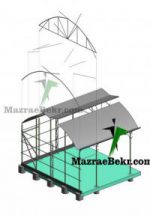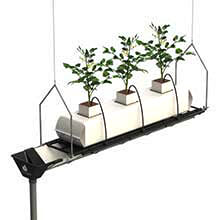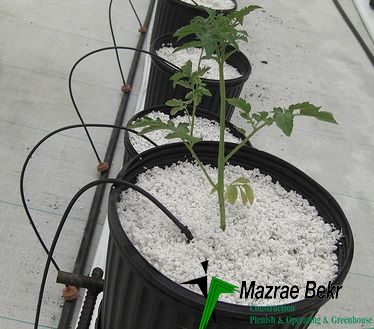Greenhouse perlite
Perlite is a type of volcanic rock with a combination of aluminum silicate and contains 2 to 6% water. When this material is exposed to heat, it is able to expand twenty times its original volume. Its expansion is due to the evaporation of water in its tissue and the formation of thousands of microscopic bubbles due to this evaporation. Properties of perlite such as high porosity, low weight, insulation and refractory due to the presence of these microscopic bubbles in the structure of perlite have expanded. By adding this volcanic rock to the soil, water can be provided to the roots in large quantities for a long time and with an even distribution in the soil, and its loss can be prevented. In fact, perlite is a very small reservoir for storing large amounts of water for the plant in the soil and gradually provides water to the roots.
The presence of porosity in it facilitates air and gas exchanges in the soil for plant roots, and as a result, improves the aeration system and soil drainage and improves soil aeration. In its presence, the problem of gas accumulation in the soil is largely eliminated. Also, due to the heating of perlite to a temperature of 1200 ° C, expanded perlite is free of any harmful microorganisms. It is usually gray before it expands, and after it is heated, the color of the perlite usually changes from light gray to white. Evidence suggests that the whiteness and insulation of perlite, as a result of the reflection of sunlight by this substance, prevents sudden changes in soil temperature and shock to the plant roots. In agriculture, sandy soils do not have the capacity to hold and absorb water, and perlite reduces the sand particles by reducing the distance from each other, increasing the ability to absorb and retain water and bring the soil closer to neutral conditions leads to the improvement of these soils.
On the other hand, in clay soils that do not have the power of gas exchange and good drainage. Addition of perlite leads to the creation of pores for drainage and gas exchange in the soil, reduces soil cracking, prevents soil compaction and thus improves root distribution in the soil. In addition to its use in soil remediation, it is very effective in greenhouses that use hydroponic cultivation to achieve the highest efficiency, because perlite has a great ability to preserve water and nutrients, and after each planting. Hydroponics can be reused and may need to be sterilized just for reuse.
to see our store click on the picture below










